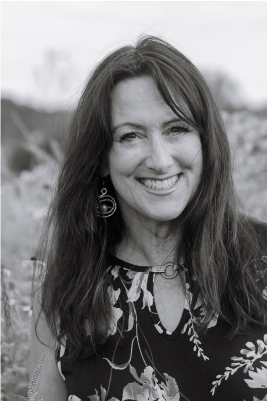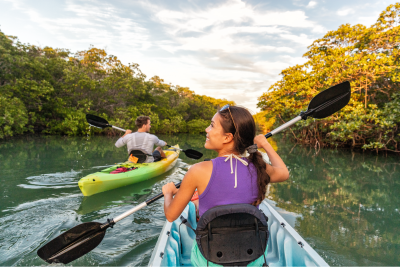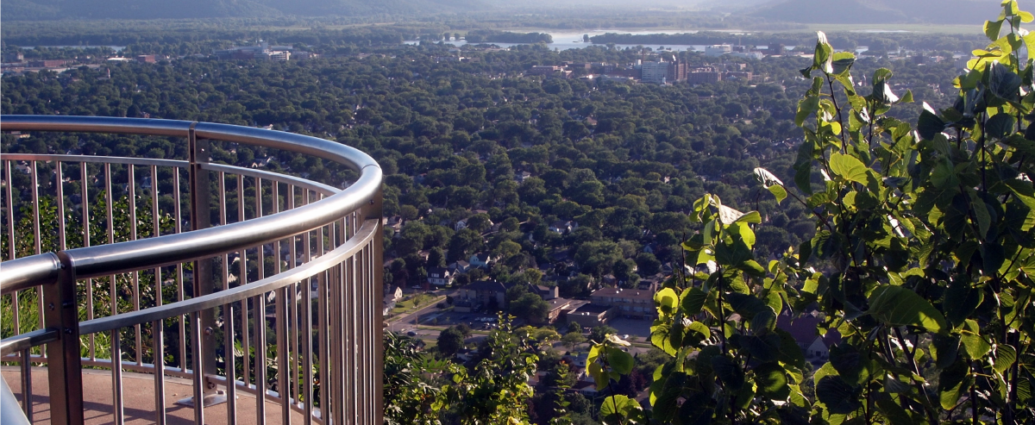 This summer has really driven home the need to make some changes in an effort to beat the heat. As we segue into fall, the weather has been relatively gentle here–a continuation of the right amount of precipitation, and the right amount of hot summer and fall days–though hotter than in the past. A stark contrast to much of the country and the world.
This summer has really driven home the need to make some changes in an effort to beat the heat. As we segue into fall, the weather has been relatively gentle here–a continuation of the right amount of precipitation, and the right amount of hot summer and fall days–though hotter than in the past. A stark contrast to much of the country and the world.
My own comfort solution so far has been to get up early. I go outside. I bike, I walk, I weed, or I hike while the light is magical, the temperature cooler, while the valleys and rolling hills of the driftless reveal themselves as the mists, before I hit the desk and do my work.. At points you can see where the vents and sinkholes are deep in the hills only by seeing the mist columns as the cooler air vents upward, hitting the warmer surface air. They show themselves at these times. .
Deep in the Driftless, I rarely see traffic; in general– often very nice paved roads, rolling through valleys and up to the ridges. This truly is a biker’s paradise for most times of the day. As spectacular afternoons with warm air, shade and sun, my companions and I can coast along, the air soft and warm. Sometimes we might see another vehicle–though often it is UTVs, or an Amish buggy with a very business-like horse trotting along. We all salute each other in passing, a civilized way of acknowledging one another.
Some positives: Wildlife, Organics, and Willpower
 Wildlife seems abundant these days, and I am told it hasn’t always been so, such as in the 70s–the rebirth of conservation initiatives and awareness, and a natural economic cycle and cultural shift of moving towards cities, resulting in population declines along with industry. That is not to say that warnings of environmental pollutants and practices were not also in the general consciousness as far back as the beginning of the industrial age–-just that major progress was made in policies and change in the 1970s. Farming has also changed alot since those early years, it wasn’t always great for the environment in the “good old days”. Both science, land management that instructs best practices, and technology (like tractors) have played a role. The most dramatic positive change, however, has been the rise of organics and even the contributions of the largely organic Amish community. Organic Cooperatives have improved our relative health, sharing their good food, and raising the bar on what it means to be a good steward of the land. We can take some comfort in that, despite the massive shifts that are now occurring relating to too many years of ignoring our problems..
Wildlife seems abundant these days, and I am told it hasn’t always been so, such as in the 70s–the rebirth of conservation initiatives and awareness, and a natural economic cycle and cultural shift of moving towards cities, resulting in population declines along with industry. That is not to say that warnings of environmental pollutants and practices were not also in the general consciousness as far back as the beginning of the industrial age–-just that major progress was made in policies and change in the 1970s. Farming has also changed alot since those early years, it wasn’t always great for the environment in the “good old days”. Both science, land management that instructs best practices, and technology (like tractors) have played a role. The most dramatic positive change, however, has been the rise of organics and even the contributions of the largely organic Amish community. Organic Cooperatives have improved our relative health, sharing their good food, and raising the bar on what it means to be a good steward of the land. We can take some comfort in that, despite the massive shifts that are now occurring relating to too many years of ignoring our problems..
Meanwhile, wildlife ranging from deer, squirrels, and majestic game birds are back, along with trout in our streams have become abundant.. The ecosystem has improved, and decades of work, easier technologies, and the reality that it is possible to live more lightly and profitably than in the past is here now. Still, continued warning signs abound. Species extinction, pollinator threats, water quality issues, and continued obstinance or ignorance show themselves daily. It is a matter of education and determination to make positive adjustments. Perhaps less mowing in yards and farms, and alot more acceptance of plants and fields of native prairie as part of our everyday lives (not just national parks). It also takes less pollinator-killing inputs that have taxed our environmental health, and basic management to keep all that manure, and soil runoff, out of our streams. Policies, personal commitment and responsibility and yes, monitoring, are all needed to keep this working. (See the interview with Forest Jahnke, of the Crawford Stewardship organization in this issue.)
I find myself vigilant watching for all sorts of that abundant wildlife whether on a bike of any type or in a car in an attempt to avoid a collision. The leaping deer or shy fawn appears so quickly coming from the tall corn, the roadside brush, or the dense forest as I whiz by. A hawk will circle, ever keen in taking road kill and transforming it into lunch. Turkeys will occasionally hurtle their big bodies skyward, and squirrels and rabbits will dart onto the road, or run alongside–I am unsure if this is their game or their fear. I have encountered plenty of clueless pheasants along the quiet roads, seemingly confused at what is happening before them as they hang out sunning themselves in the middle of the road, and they ignore the oncoming vehicle, something curious, not threatening.. Pausing along a slough or a marshy area, it is common to see the grace and dignity of those large swans or Sand Hill cranes. Eagles, hawks, geese or ducks, all find their places. Lately, I am happy to see our growing stands of milkweed and spotting a few Monarch butterflies which give us hope on fragile wings. All because we chose not to mow in those areas for a year or so. And yes, I am cheered by diverse fields of pollinator food or a lush front yard garden instead of the ubiquitous mowed field.
Respectful Activism
 There are larger issues of course than my own comfort zone. As I watch the sportscaster reporting on the horse race of politics–the noise too often overcomes the real urgency of climate change –and our own need to react quickly. To be clear–all this is not “sport”–policies affect our world, and our lives. I talked about climate issues publicly with a bit of hesitation 10 years ago as a Disaster Recovery Coordinator for a small village, not wanting to upset our very hard line Governor Walker and his administration’s position that climate change must not be discussed–even for those assigned within the administration and agencies to assist industry to adapt. That administration resulted in years lost in responding–or proactively addressing the reality of it all, foregoing investments in infrastructure that would have meant jobs across the region, bring us all into the 21st century with transportation–at least another option in high speed rail–connecting our cities across the region and resulting in much needed local and regional economic development, attracting workers and tourism. The project was a go, paid for, and ready, and was canceled within weeks of taking office–presumably a demonstration of both power and a hollow nod to professed conservatism., which is ironic. Conserving our resources IS the ultimate in the real meaning of conservatism. So, we dealt with it as advancement and proactive investment was not part of that party’s brand. Instead we got boondoggle investment in the form of FoxConn, (surprise?) and years set back in what was needed in investing in our state and the region.
There are larger issues of course than my own comfort zone. As I watch the sportscaster reporting on the horse race of politics–the noise too often overcomes the real urgency of climate change –and our own need to react quickly. To be clear–all this is not “sport”–policies affect our world, and our lives. I talked about climate issues publicly with a bit of hesitation 10 years ago as a Disaster Recovery Coordinator for a small village, not wanting to upset our very hard line Governor Walker and his administration’s position that climate change must not be discussed–even for those assigned within the administration and agencies to assist industry to adapt. That administration resulted in years lost in responding–or proactively addressing the reality of it all, foregoing investments in infrastructure that would have meant jobs across the region, bring us all into the 21st century with transportation–at least another option in high speed rail–connecting our cities across the region and resulting in much needed local and regional economic development, attracting workers and tourism. The project was a go, paid for, and ready, and was canceled within weeks of taking office–presumably a demonstration of both power and a hollow nod to professed conservatism., which is ironic. Conserving our resources IS the ultimate in the real meaning of conservatism. So, we dealt with it as advancement and proactive investment was not part of that party’s brand. Instead we got boondoggle investment in the form of FoxConn, (surprise?) and years set back in what was needed in investing in our state and the region.
Politics, and policy matters. As of this writing, I am grateful for the IRA (Inflation Reduction Act) just signed, which will invest billions into climate change action, reducing carbons, stimulating clean energy jobs, and paid for through tax adjustments on very profitable corporations in the upper echelon of size and value.
.
These days I am personally emerging out of my comfort zone and speaking more freely. I need to do what I can, despite the ingrained perspective of not speaking about politics for fear of offending. I will not succumb to disrespect for others, but instead I am willing to listen and will respectfully discuss the matter with factual information with anyone about any topic related to our climate emergencies–the economics of it, migration, preparedness, community, politics, and personal responsibility–and I will continue to learn about issues and situations I am not educated about. From credible sources. All of this is connected to the fight at hand for survival, and we must just stop obstructing the very real task at hand and learn to adapt in a civilized, collaborative manner. I hope you do the same, dear reader.
We have organizations, administrations locally, statewide, and nationally that are fighting for policies that will drive positive action and change, rapid response if you will to what is not just change, but an emergency. Though it seems tough for many of us mortals to recognize change as it is happening, I suggest taking a look at one news cycle and you will get the picture–one or two “events’ of note will happen almost daily across our fragile world, and very likely nearby
Destruction, shortages, economic upheaval, difficulty in accepting the reality of all types of migration and change–or just plain being hot or responding to a crisis in your family life or community–we are questioning where we are on this planet. People, plants, and animals have always migrated when the local situation does not support life very well–and it is shortsighed not to figure out a way to avoid chaos and instead embrace the opportunity of this reality. People fight when resources that mean survival are missing. Plants we are familiar with and depend upon for food will not be able to tolerate our standard way of growing them, or in this region, as they could previously. Alarmingly, you may choose to ignore these signs, but the interconnected species of all sorts will continue to disappear from where we expect to find them, in our lifetimes or for forever.
Personal choices. Something as innocuous and healthy as the almond…regardless of my striving for healthy eating, I also need to consider the impact of almonds (and other products) and drought, and where many many almonds come from (California)–the true bread basket of our nation Though a personal fan of the nut, I must now not participate in the industry, as each almond consumes the beloved Colorado River and water reserves at alarming rates in the Southwest. So cheers for our hazelnut products–natural to Wisconsin–an adaptable solution.
Sustainable action in politics in not radical–but practical
I am not advocating for a new “Green Party” (I remember 200 and 2016) or radical solutions–normal responsibility and proactive thinking are not radical.. I am advocating for a wiser, smarter, and across the board change in all people and in all administrations as to how we relate to one another, and to our environment. That means personal responsibility, and local, state, and federal collective policies that guide and enforce action that one individual could not possibly handle on their own—like the safety and health of our air, water, and soils–which we all share across property lines and borders.
I encourage you to imagine everything you cherish being wiped out by an environmental disaster–and for some in the Driftless, it is easier, despite flooding and extreme weather has impacted many. We have water. But even with water available, how we treat the land will still impact the good and the bad of quality water. We also have to change–where we build, what we build, how we farm, what we plant. If you haven’t been impacted personally yet, imagine flood, drought, fire, hurricane, crop failures, tornadoes–extreme weather–take your pick. Don’t forget thoughtless and self-serving (and avoidable) contaminants and pollution.
What to do?
Remember those that have actively worked to strip away agency powers to protect our water, soil and air. Don’t allow them another minute to “represent” us in office.
Think in terms of how we can work together to not just tolerate change, but embrace it,as we slow-to-learn humans must adapt in a quick fashion to accommodate all the changes around us–and share that knowledge with all who you know.. Your local boards, state level, and as a nation all make a difference. We have the smarts, it is doable–it is an opportunity on so many levels. To achieve this, that includes respectful discourse and collaborative problem solving on all levels, not obstructions, but instead brainstorming solutions together.
And of course, it comes down to sustainability. Because without operating in all areas with that in mind, your pet politics really won’t matter a whit, even more chaos will be coming, and we cannot hide from what we are dealing with–massive change–any longer.
Otherwise, it will feel very very hot, and here, very very wet as well. Even in the early morning.
Contributing Editor: Julia Henley

